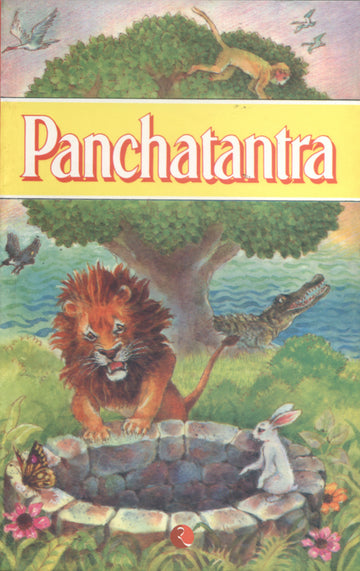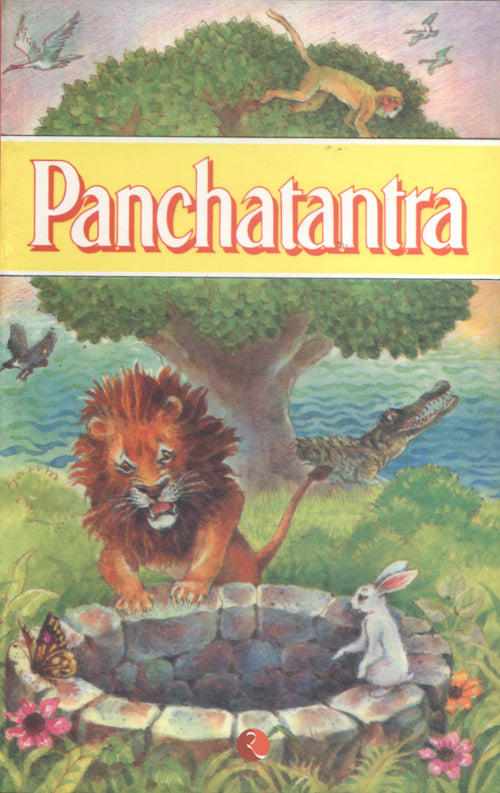The Panchatantra of Vishnusharma
Regular price
₹ 949
Sale price
₹ 949
Regular price
₹ 999
Unit price
Save 5%
Tax included.
| Item Weight | 593 Grams |
| ISBN | 9789393852199 |
| Author | Meena Arora Nayak |
| Language | English |
| Publisher | Aleph Book Company |
| Pages | 416 |
| Dimensions | NA |
| Publishing year | NA |
| Edition | 1st |
| Return Policy | 5 days Return and Exchange |

The Panchatantra of Vishnusharma
Product description
Shipping & Return
Offers & Coupons
Authored in about 345–300 BCE by Vishnusharma, the Panchatantra has long been considered one of India’s invaluable gifts
to the world. Its creation is the stuff of legend: in an effort to expedite the education of his three unschooled sons, the wise King
Amarashakti of Mahilaropya sought out the octogenarian scholar Vishnusharma, who was known for his inventive teaching
methods. Vishnusharma not only accepted the task of educating the princes but also said that he would accomplish it in six
months. The Nitishastra he used to teach the princes was one he composed specifically for the purpose and this was called the
Panchatantra—five treatises.
‘Mitra Bheda’ (breach of friendship), the longest of the sections, is framed around the deep friendship between a lion, Pingalaka,
and a bull, Sanjivaka, and narrates how they are turned against each other, raising the question: can two animals who are natural
enemies ever be friends? The second tantra, ‘Mitra Samprapti’ (acquisition of friends), relates how a crow, mouse, tortoise, and
deer become friends, and shows how friendship between the small and powerless is beneficial to all involved. ‘Kakolukiyam’ (of
crows and owls), the third tantra, is a narrative that draws from Kautilya’s six-fold state policy, which is woven into the tantra’s frame story that describes a vendetta between crows and owls. The fourth tantra, ‘Labdha Pranasham’ (loss of acquired gains), is
centred around the well-known tale of a crocodile’s treasured friendship with a monkey and how he loses it when his wife develops
a hankering for the monkey’s heart. ‘Aparikshita Karakam’ (impetuous actions), the last tantra, is unique for its focus on human
characters. The framing tale is about a barber who, under a misconception, assaults monks, rashly assuming that this will bring
him gold. It makes the case that reckless actions, especially when they are triggered by greed, end in failure and grief.
The sixty-nine stories in the Panchatantra cut a wide swathe, depicting as large a slice of life as possible. The cast of characters
consists of lions, tigers, wolves, cats, tortoises, monkeys, deer, hares, snakes; crows, cranes, and various other birds; and water
creatures, such as fish and crabs. There are also some humans, such as weavers and barbers, fowlers and hunters, as well as wealthy
merchants, and ministers, kings, and, along with these, a smattering of priests. While in recent times it has been largely treated
as children’s literature, the Panchatantra is a timeless book of wisdom for all ages, filled with tales laced with insight, cogent
witticisms, and lessons about living. In this retelling of the ancient text, Meena Arora Nayak creates a work that is lucid, fluent,
and engaging, while keeping the essence of its magnificence intact.
to the world. Its creation is the stuff of legend: in an effort to expedite the education of his three unschooled sons, the wise King
Amarashakti of Mahilaropya sought out the octogenarian scholar Vishnusharma, who was known for his inventive teaching
methods. Vishnusharma not only accepted the task of educating the princes but also said that he would accomplish it in six
months. The Nitishastra he used to teach the princes was one he composed specifically for the purpose and this was called the
Panchatantra—five treatises.
‘Mitra Bheda’ (breach of friendship), the longest of the sections, is framed around the deep friendship between a lion, Pingalaka,
and a bull, Sanjivaka, and narrates how they are turned against each other, raising the question: can two animals who are natural
enemies ever be friends? The second tantra, ‘Mitra Samprapti’ (acquisition of friends), relates how a crow, mouse, tortoise, and
deer become friends, and shows how friendship between the small and powerless is beneficial to all involved. ‘Kakolukiyam’ (of
crows and owls), the third tantra, is a narrative that draws from Kautilya’s six-fold state policy, which is woven into the tantra’s frame story that describes a vendetta between crows and owls. The fourth tantra, ‘Labdha Pranasham’ (loss of acquired gains), is
centred around the well-known tale of a crocodile’s treasured friendship with a monkey and how he loses it when his wife develops
a hankering for the monkey’s heart. ‘Aparikshita Karakam’ (impetuous actions), the last tantra, is unique for its focus on human
characters. The framing tale is about a barber who, under a misconception, assaults monks, rashly assuming that this will bring
him gold. It makes the case that reckless actions, especially when they are triggered by greed, end in failure and grief.
The sixty-nine stories in the Panchatantra cut a wide swathe, depicting as large a slice of life as possible. The cast of characters
consists of lions, tigers, wolves, cats, tortoises, monkeys, deer, hares, snakes; crows, cranes, and various other birds; and water
creatures, such as fish and crabs. There are also some humans, such as weavers and barbers, fowlers and hunters, as well as wealthy
merchants, and ministers, kings, and, along with these, a smattering of priests. While in recent times it has been largely treated
as children’s literature, the Panchatantra is a timeless book of wisdom for all ages, filled with tales laced with insight, cogent
witticisms, and lessons about living. In this retelling of the ancient text, Meena Arora Nayak creates a work that is lucid, fluent,
and engaging, while keeping the essence of its magnificence intact.
- Sabr– Your order is usually dispatched within 24 hours of placing the order.
- Raftaar– We offer express delivery, typically arriving in 2-5 days. Please keep your phone reachable.
- Sukoon– Easy returns and replacements within 5 days.
- Dastoor– COD and shipping charges may apply to certain items.
Use code FIRSTORDER to get 5% off your first order.
You can also Earn up to 10% Cashback with POP Coins and redeem it in your future orders.








